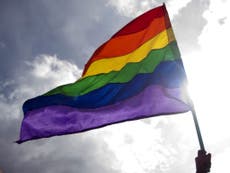There will come a point when being a member of the LGBTQ+ community is not a big deal – we are not there yet
This LGBT History Month is a chance to celebrate our diverse community and strive for a more inclusive society, writes David Mundell


I feel very lucky because my own experience since coming out has been overwhelmingly positive, with the benefit of a loving family, great friends and a supportive work environment. Colleagues across the political divide messaged me their support and the already strong LGBTQ+ community across parliament welcomed me. Nor did it stand in the way of my political career: I was the first openly gay Conservative cabinet member and was hugely honoured when my then cabinet colleague, Justine Greening, subsequently said I was the inspiration for her own coming out.
Only one constituent has raised my coming out negatively with me face to face on the doorstep and I’ve never yet experienced verbal abuse, but of course there is a well of poison on social media. Homophobia is part of that and sometimes directed at me. What happens now on social media is a wider problem in our society and frankly I don’t even read most of what’s said about me. But there are times you must push back.
For me, that occasion was when a blogger suggested that gay people should not have children, with particular reference to my son Oliver Mundell who is a Conservative Party MSP. The former Labour leader in the Scottish parliament, Kezia Dugdale, was among those who spoke up for us. She ended up being sued for defamation by the man in question for calling the comment “homophobic”. It went to court and I am pleased to say he lost, which I regard as a victory, at least in Scotland, for those willing to stand up to homophobia. I remain very grateful to Kezia for her support.
Sadly, my own overwhelmingly positive experience is not the case for everyone who comes out in our country and why, for many, the decision to do so is still such a hard one. I know that other MPs have faced abuse and hardship as a result of their identity and indeed, despite our record numbers of LGBTQ+ MPs, there are some who have chosen not to come out.
It is always a personal decision and there is no one approach, or right answer as to how to do it. Everyone must do what is right for them. What is not acceptable is that people feel unable to come out because of fear of abuse or discrimination, and parliamentarians have a duty to ensure that sexuality is never a barrier for people who wish to pursue a career in public office.
And, of course, this is not just about MPs’ own lives. It’s our job to stand up for the young people bullied at school, those discriminated against whatever their workplace, and particularly members of the trans community who continue to experience so much prejudice and inequality, and have their human rights abused.
I strongly believe that education is our most powerful tool to bring about real change. I welcome parliament’s efforts in providing more resources for school students to develop their thinking about LGBTQ+ rights, equality and legislation, but there is so much more work that needs to be done in this area if we want a better and more equal future.
As I have said, as MPs we have a responsibility to call out any discrimination and highlight the injustices members of the LGBTQ+ community face, but not just in the UK. I see this as an important part of my role as a member of the Executive Committee of the Commonwealth Parliamentary Association (CPA UK). I hope that I will be able to push LGBTQ+ equality and human rights up the Commonwealth agenda, delivering better rights for LGBTQ+ communities around the world. It’s totally unacceptable that in some Commonwealth countries the death penalty still applies for homosexuality and in others, LGBTQ+ people are routinely harassed or arrested by the authorities. We can’t turn a blind eye to that.
There is good news, too. Since I was first elected in 2005, parliament has made great strides to become a more inclusive and diverse organisation. It has become a fantastic working environment for those of us in the LGBTQ+ community – and the efforts of parliament’s LGBTQ+ workplace equality network ParliOUT, which recently celebrated its 10-year anniversary, have played a huge role in achieving this. It has been especially encouraging to see such an increase in LGBTQ+ MPs following the 2019 general election and I was proud to be included in this number.
Looking ahead I hope that there will come a point that being a member of the LGBTQ+ community is no longer seen as a big deal by anyone – when instead, we are all accepted and included for who we are with no questions asked. We are not there yet, but in the meantime, I am encouraged by the strength of our community and the work of our allies. By continuing to fight discrimination and promote inclusivity, we can do our best to make sure that young people growing up as LGBTQ+ here, and around the globe, can live in a world of tolerance and acceptance.
This February, parliament and indeed the country as a whole is marking LGBT+ History Month with the theme “Mind, Body and Spirit”. It is a chance to celebrate our LGBTQ+ colleagues while also building awareness of the diverse and vibrant nature of our community, as we strive to create a more inclusive society.
David Mundell is the Conservative MP for Dumfriesshire, Clydesdale and Tweeddale




Join our commenting forum
Join thought-provoking conversations, follow other Independent readers and see their replies
Comments